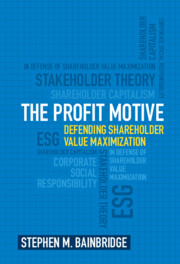Refine search
Actions for selected content:
5 results
12 - Practitioner Views of Corporate Political Responsibility
- from Section V - Implementing Corporate Political Responsibility: Opportunities and Challenges
-
-
- Book:
- Corporate Political Responsibility
- Published online:
- 16 November 2023
- Print publication:
- 30 November 2023, pp 355-388
-
- Chapter
- Export citation
Conclusion
-
- Book:
- The Profit Motive
- Published online:
- 02 February 2023
- Print publication:
- 09 February 2023, pp 169-170
-
- Chapter
- Export citation
Introduction
-
- Book:
- The Profit Motive
- Published online:
- 02 February 2023
- Print publication:
- 09 February 2023, pp 1-24
-
- Chapter
- Export citation
10 - Why the Business Roundtable CEOs Should Have Stayed the Course
- from Part II - The Merits
-
- Book:
- The Profit Motive
- Published online:
- 02 February 2023
- Print publication:
- 09 February 2023, pp 125-168
-
- Chapter
- Export citation

The Profit Motive
- Defending Shareholder Value Maximization
-
- Published online:
- 02 February 2023
- Print publication:
- 09 February 2023
